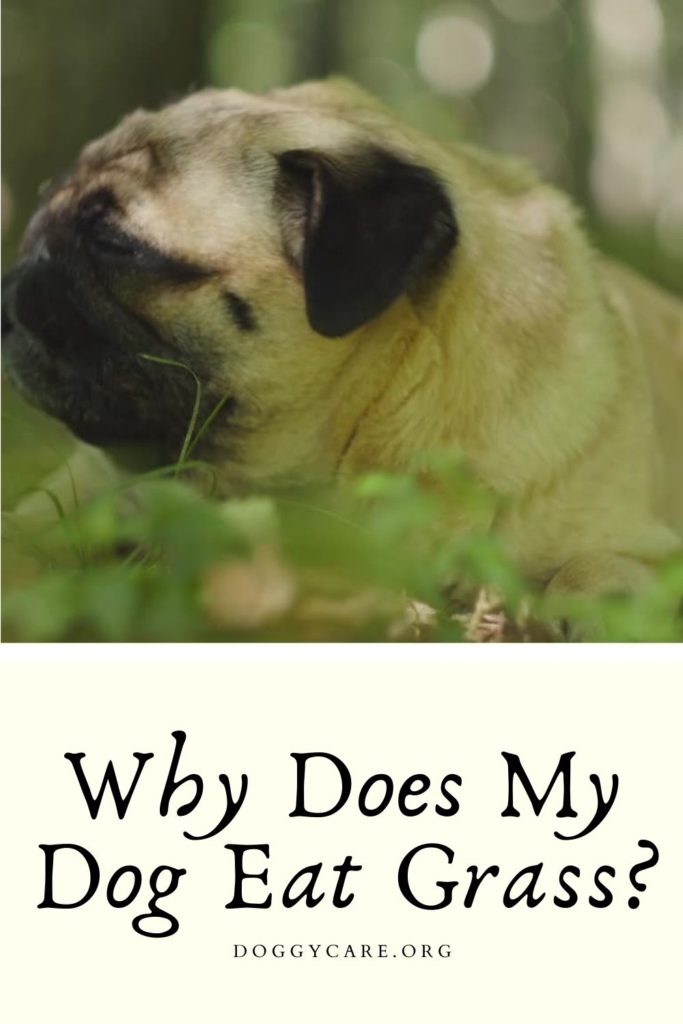- You are here:
- Home »
- Dog Food
- » Why Does My Dog Keep Eating Grass?
Why Does My Dog Keep Eating Grass?

Many dog owners pay attention to a phenomenon that seems strange to them, occasionally the dog eats grass during the walk, and often vomits afterwards.
Can a dog eat grass?
If our dog also has a habit of eating grass, we can relax. Dogs have been eating grass for thousands of years and no one has discovered anything wrong with it. The truth is that it is not clear to us exactly why dogs eat grass, but there can be several possible reasons for this.
Why Dogs Like To Eat Grass?
Inherited Behaviour
In the wild, before humans domesticated dogs, they ate the entire prey in all its parts. The ancient dogs preyed on herbivores, so that they also ate grass that was in the stomach of their prey. Grass is a normal component in dogs’ nutrition throughout their historical development process, and in fact, it has been a continuation of natural behavior since time immemorial.
Why does my dog keep eating grass?
Diet Needs
Some veterinarians think that eating grass stems from a lack of dietary fiber in the dog’s food. Studies have shown that the addition of fiber to a dog’s food reduces eating grass in dogs that have a tendency to eat grass.
Boredom
A hyperactive dog without any avenues for entertainment, may end up getting bored and start looking for activities to fill the missing space and entertain himself. Surprisingly, one of the activities may involve eating the grass (or in worse cases – digging pits!).
Therefore, a good starting point is to evaluate how much exercise your dog does on a daily basis and is it enough for him. It is recommended to combine the usual activities with other attractions like, playing in the dog park, pulling the rope, practicing commands, learning new commands.
Why do dogs eat grass and vomit?
Dogs seem to tend to eat grass especially when they suffer from some stomach irritation or abdominal pain. Eating the grass makes it easier for them but can also make them vomit. They do not eat grass to vomit but vomit because they ate grass. In any case, even if it relieves them, it is not healthy for them – frequent vomiting can cause esophagitis, dehydration and more. It is important to find out what is causing the dog abdominal pain and treat it appropriately.
The texture of the grass causes a gentle irritation in the abdomen, which can be followed by vomiting.
Perhaps one of the reasons dogs throw up after eating grass, and others do not vomit, is the way they chew. If the dog chews the grass thoroughly, only very small pieces of grass will enter the abdomen so that the stomach will not respond to them. On the other hand, dogs that feel abdominal pain are hurry when eating grass, so they do not chew well, which leads to large chunks of grass in the stomach, which irritate the stomach cells and cause vomiting.
An article published in the well-known veterinary journal “VETERINARY MEDICINE” describes a study on 25 dogs of students attending the School of Veterinary Medicine. The study examined the question and background to the issue and came up with some answers: What is the prevalence of dogs eating grass? Do they always vomit afterwards?
The findings showed that all the dogs tested ate grass, none of their owners reported feeling bad according to the study, only 8% of the students testified that the dogs vomited after eating.
In conclusion, eating grass is not necessarily related to any disease and the vomiting effect is a random event that is not necessarily related to eating the grass. The dogs do not eat grass to vomit but vomit because they ate grass.
Is it ok for dogs to eat grass?
It is generally advisable to prevent the dog from eating grass. – We invest in expensive and quality food for our dog and in the end he eats grass outside that healthy and sick dogs and cats have defecated, the gardener may have sprayed the grass with pesticides and while eating the grass can also be infected with worms and especially accidentally swallow the beetle that is a source of infection for the park worm!
If we still insist on a diet rich in grass, make sure that the grass is well cared for, without sprays and / or other chemicals, free of pests or disease-causing insects.
If it seems to us that the phenomenon occurs frequently or that the amount of grass the dog eats is unreasonable, a vet should be consulted.